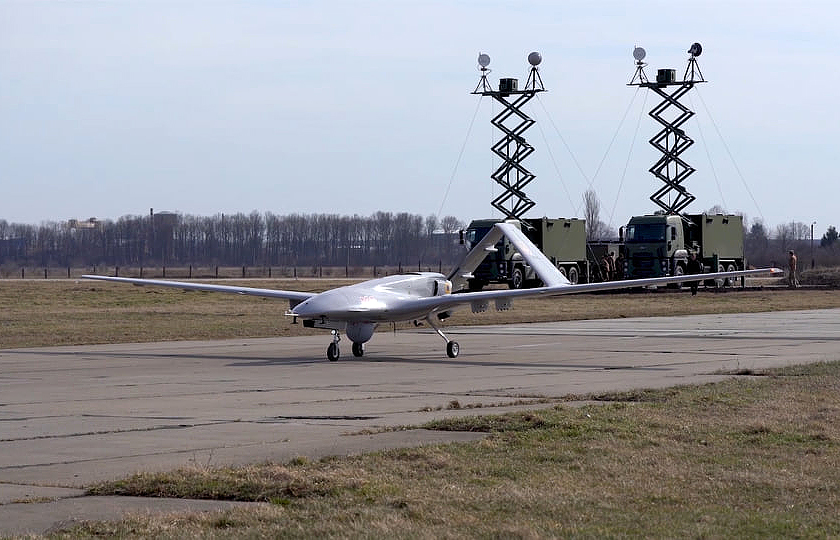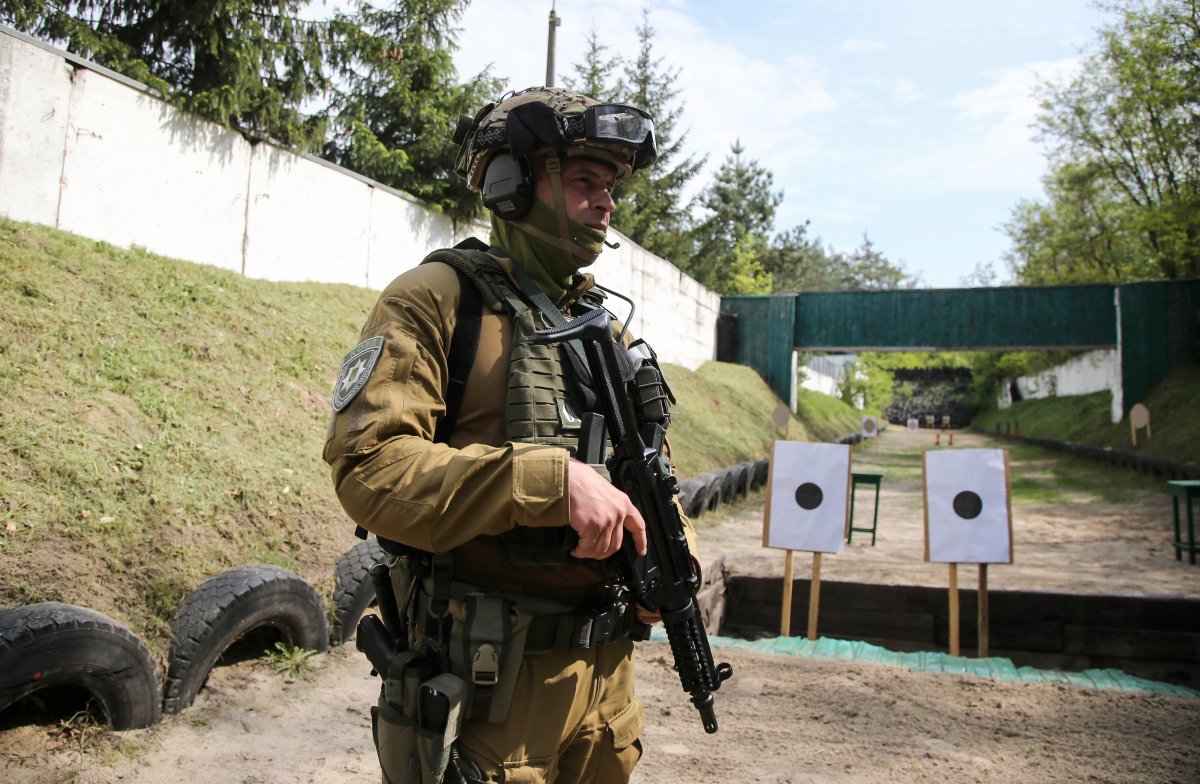When it comes to defense cooperation between Kyiv and Ankara, it’s all about pragmatism and pursuing common ends together — and also about stunning rates of growth.
In just three years, Turkey became Ukraine’s top partner in terms of joint development and production of military hardware and investment in Ukraine’s dwindling, but still rather potent defense industry.
Turkish money and manufacturing assets enter cooperation with Ukrainian engineering concepts and designs, eventually giving birth to new advanced drones and also admitting Ukraine to arms markets from which it is normally excluded.
It’s a win-win marriage, even though Turkey is also a heavy buyer of Russian military hardware and is entering an alliance of convenience with the Kremlin in Syria.
According to experts, this multi-faceted policy is nothing but the pursuit of Ankara’s national interests — and nothing prevents Ukraine from also playing realpolitik and boosting the rearmament of its military with the help of juicy defense contracts with Turkey.
Mutual gain
In many ways, Turkey grew tempted by the Ukrainian arms market due to a certain vacuum in this sector that emerged following the eruption of Russia’s war against Ukraine in 2014. In its standoff with the Kremlin, Ukraine was in dire need of advanced weapons and equipment, something to alleviate its weakness and obsoleteness in modern warfare.
Military aid from the United States, which reached $1.5 billion by 2019, has partially helped make up for those flaws. But Ukraine still needs something more than just receiving aid — to have its defense production revitalized and regain its status as a major player in the global arms market.
Ukraine lacks the money and technologies needed to convert designs and sketches into real weapons rolling down factory conveyer belts. As a result, it needs immense investments and access to sensible technologies at joint defense enterprises with foreign actors.
However, for many in the West, such cooperation was politically suspect — but not for Turkey, which was much less picky in this regard.
“We could have had joint enterprises with other NATO nations, including the United States, Poland, or France,” says Mykhailo Samus, the deputy director of the Center for Army, Conversion and Disarmament Studies, a Kyiv-based think tank.
“But it just happened that those countries have certain limitations, especially when it comes to France or Germany, regarding cooperation with Ukraine.”
And that is when Ankara saw major opportunities — and it had something to offer in return as well.
“Turkey has an amply developed defense industry that has worked for several decades purposefully on creating a technological and industrial base that is now one of the world’s best,” says Samus.
“For Ukraine, this is a source of technologies, experience, and even some already-produced hardware, such as drones or communication systems.”
Immediate opportunities
This is always more than just a money-making business.
By proposing attractive, multiyear deals, Ankara is also thinking about the future by making Ukraine its established customer and partner tied to Turkish technologies and projects.
“On the other hand, this is also commercially beneficial cooperation, because Ukraine is becoming an increasingly attractive market,” Samus says.
“Our military budget increases (reaching $5.5 billion in 2019), and we are in conflict with Russia, which is not likely to end soon. Those staking out the first claim in this market will be among the biggest beneficiaries of its future expansion.”
Although certain contacts in the defense sector between Kyiv and Ankara were made in the early 2010s, activities greatly intensified starting in 2016.
By that time, Ukraine had launched its in-depth program of rearmament, raising demand for a broad spectrum of modern military hardware, from hi-tech weaponry like drones or radio-electronic jamming systems to tactical equipment.
That was music to Turkish ears.
“Turkey, being a country that is now trying to develop its export potential, is interested in new markets,” says Anton Mikhnenko, chief editor of the Ukrainian Defense Review.
“A year or two ago, annual Turkish arms exports constituted nearly $600 million, but (the country) seeks to pass the bar of several billion dollars by the end of this year or early next year. So Turkey sees Ukraine as a partner in creating new weapons — and also a country they can sell their military hardware to.”
Quick results
Since then, Turkey has become the country most frequently mentioned in news about fresh multi-million-dollar arms deals with Kyiv.
In many instances, Ankara almost immediately proposed its business solutions for many of Ukraine’s most problematic issues of rearmament that would have been difficult to resolve in Western markets.
As recently as on Oct. 23, the Turkish company Baykar reported the completion of their $69-million contract to produce Bayraktar TB2 unmanned aerial systems for Ukraine.

A Bayraktar TB2 drone system undergoes a test flight at a Ukrainian Air Force airfield in Starokostyantyniv on Oct. 21, 2019. (Ukraine's Air Force)
The contract, signed just a year ago in November 2018, envisaged providing Ukraine with six combat drones and two control stations. The company also assumed responsibility to provide complete training to nearly 30 Ukrainian military personnel expected to maintain and operate the drones, including for the use in combat in the war zone of Donbas.
These days, the drone systems are undergoing their final tests at Ukraine’s Starokostyantyniv military airfield near the city of Khmelnytsky. In fact, this purchase is the first modern strike unmanned aerial vehicle system produced abroad and accepted for service by Ukrainian Armed Forces.
Moreover, the Turkish party also contemplated launching a production line for Bayraktar systems in Ukraine, particularly in the form of a joint enterprise with legendary Ukrainian aircraft manufacturer Antonov Company.
A different joint Turkish-Ukrainian defense production venture was created as early as August 2019. According to Ukraine’s National Security and Defense Council, the new undertaking was formed to “unify the capabilities of the defense industries of the two nations in the serial manufacturing of new modern hardware for their militaries.”
The enterprise will be focused on precision weapons and aerospace technologies, and it “will allow (us) to back off from classic buy-and-sell arms contracts in favor of a brand new form of cooperation — the synergy of defense technologies and advanced designs of Turkey and Ukraine,” the Council said.
Drones, firearms, and radios
The joint venture’s first common project to become publicly known was yet another strike drone system called Akinci and developed by Baykar. The drone’s early prototype was initially demonstrated in 2018 in Turkey, but the project eventually jumpstarted thanks to engines produced by Motor Sich, the major Ukrainian aerospace company based in Zaporizhia.
In the coming weeks, the strike drone system, armed with air-to-ground missiles and electronic warfare equipment and capable of staying airborne for 24 hours, is expected to make its maiden flight.
Earlier in 2019, Turkish manufacturers came to the rescue as Ukraine’s National Police decided to eventually relinquish their long-standing workhorse Kalashnikov assault rifles and carbines in favor of globally popular 9-millimeter MP5 submachine guns designed by Germany’s Heckler & Koch.
Special police units and patrols, as well as border guards, were to be rearmed with MP5s — but, according to sources in the industry, a deal between the original German manufacturer and Kyiv was impossible for political reasons.
So the classified contract was reportedly taken over by Turkey’s MKEK company, which has been producing MP5s under license since 1984. Since roughly spring 2019, on Ukrainian streets, in airports, and in other public places one can see numerous police patrols armed with the famous, newly-produced carbines instead of the old Kalashnikov AKS-74U rifles.

Ukraine’s KORD special police unit personnel presents their new Heckler & Koch MP5 submachine guns at a firing range near Kyiv on May 15, 2019. (UNIAN)
Another important deal was the $6-million contract to purchase modern ultra-short-band radio stations, which had been in urgent demand in the Ukrainian Armed Forces for decades. The principal deal with Turkish company ASELSAN was signed in 2016, and, according to the Ukrainian military, all fighting units will switch to using the Turkish radio sets by 2020.
In July 2019, an ASELSAN station was tested on board a Ukrainian Air Force L‑39 Albatros training aircraft and received positive feedback due to its strong resistance to jamming and its ability to ensure stable communication at a distance of hundreds of kilometers.
Bunches of smaller contracts, including those envisaging Ukraine selling its hardware and rendering services to Turkey, keep flowing: repair works for Mikoyan Mi‑17 helicopters, the development of Turkish-Ukrainian combat module Sardar for Qatar, the sales of Ukrainian 120-millimeter guided missiles Konus (which are also supposed to be produced in Turkey in the future after Ukraine transfers its technologies), the Ukrainian production of 6TD3 tanks for Turkish Altay main battle tanks, and much more.
“It is clear that we and the Turks have found a common language and point of common interests,” says Mikhnenko.
“Both sides are quite happy with what’s going on in the defense production domain.”
In general, even though Turkey is also enhancing its ties with Russian military production, particularly regarding the scandal-ridden deal to purchase S‑400 air defense missiles, Ukraine should follow Ankara’s example of pursuing purely selfish, shrewd policies, the expert believes.
“Every decision must be made from the perspective of Ukrainian national interests,” he adds.
“If buying something from Turks, or developing something to obtain technologies, is beneficial to us, then we must try and proceed — of course, staying mindful about possible risks.”
